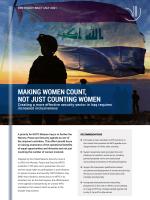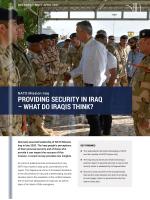Providing security in Iraq - what do Iraqis think?
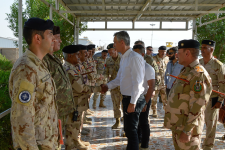
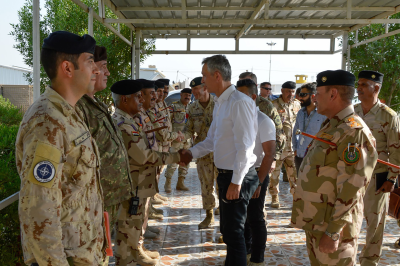
- The respondents had limited knowledge of NATO and the mandate of NATO Mission Iraq.
- The Iraqi security forces are viewed as having a positive impact on personal security in Iraq, but the security sector is weakened by its fragmentation.
- Security is a key concern for the surveyed Iraqis, that see the rivalry between Iran and US as having an even bigger impact on personal security than Islamic State does.
Denmark assumed leadership of NATO Mission Iraq in late 2020. The Iraqi people’s perceptions of their personal security and of those who provide it can impact the success of this mission. A recent survey provides new insights.
At a time of political turmoil and insecurity in Iraq, NATO has vowed to step up its commitment in the region. This happens at a time of increased resistance to the US presence in Iraq, and a deteriorating security situation due to the escalation of the conflict between the US and Iran taking place on Iraqi soil, as well as signs of an Islamic State resurgence. Security is a major concern in Iraq. When respondents were asked to select their most important concern for the Iraqi government to address, the most common choice was ‘maintaining security and stability’ (30.5%), closely followed by the job situation (27.5%), and corruption (26.2%).
This should be read in conjunction with the fact that 71.7% of respondents stated that they experience their personal security as currently either only partially or not at all ensured. This was most pronounced among the surveyed Shias, with only 18.8% indicating that they feel fully or partly secure in contrast to 46.7% of Sunni respondents.
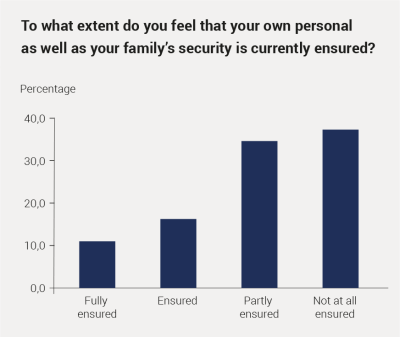
The Iraqi security sector is fragmented
In 2014 the Iraqi army dissolved as Islamic State overran key Iraqi cities like Mosul and came close to Baghdad. In response, civilian Iraqis joined the fight against Islamic State to save their homes, in the process boosting the Popular Mobilization Forces (PMF), a network of militias that enjoy a symbiotic relationship with the Iraqi security forces and political parties. Formally, the PMF are integrated into the Iraqi security forces, but key militias continue to operate with limited oversight from the Iraqi state, thus underscoring the fragmentation of actors involved in the provision of (in)security in Iraq. This fragmentation is reflected in the survey. A majority of respondents (60%) pointed to the Iraqi security forces as the actor with the most positive impact on their personal safety. The remainder were divided with close to 15% pointing to the PMF and 10.5% pointing to tribal leaders.
Those pointing to the Iraqi security forces as having the most positive impact on their personal security were largely consistent across ethnicity and religious denomination. However, Kurds were less likely to point to the PMF as having a positive impact on their security, and Shias were more likely than Sunnis to point to the PMF as having a positive impact on personal security. Overall, the relationship between Iran and the US was indicated as having the most negative impact on personal security (more than Islamic State). Shias (32.3%) were more likely to point to this relationship as negatively impacting their security than Sunnis (23.8%).
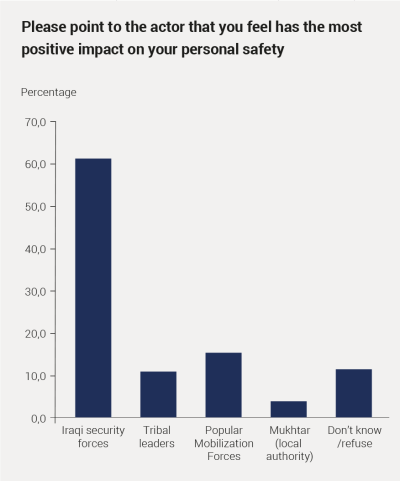
The potential of the Iraqi security forces is hampered by persisting issues related to their performance. The aim of security sector reform in Iraq has been to achieve a security sector that is accountable to law, protects human rights, and can be trusted to protect all citizens. In the survey, 31.6% of respondents indicated that they do not believe that the Iraqi security forces protect all Iraqis equally. Sunnis were more likely than Shias to state that the Iraqi security forces do not protect all equally.
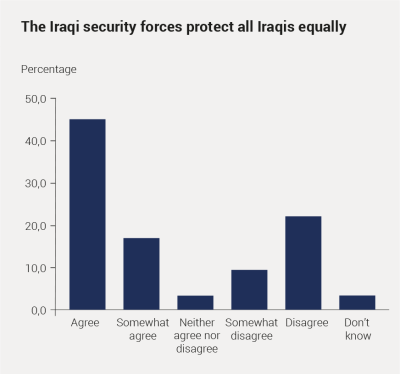
It is moreover noteworthy that 24.8% either ‘somewhat disagree’ or ‘disagree’ that the Iraqi security forces respect human rights. The issue with accountability is further underscored as 19.4% of the respondents disagree or somewhat disagree that Iraqi security forces abide by Iraqi law. Specifically, the survey indicates major problems with corruption as only 7.1% indicated that that there is no corruption in the security forces whereas 47.8% described the security forces as corrupt to a large extent. The survey highlights that there are serious issues with the capacity of the Iraqi security forces. This is a concern as citizens’ perceptions of security forces may impact their level of compliance, as well as their potential reliance on non-state actors for security provision.
Limited knowledge of NATO among Iraqis
The NATO Mission Iraq (NMI) strongly emphasises that NATO has agreed to establish an advisory, training and capacity-building mission in Iraq at the request of the Iraqi government. The aim is to build the capacity of the Iraqi security forces so that they will no longer require the support of NATO. But a recurring theme of the survey results in relation to NATO is that the mandate of NMI is not clear to most Iraqis. The questions on NATO had the highest rates of non-response and opinions were divided. When asked a multiple-choice question on the definition of NATO, 45.5% did not respond and only 28.5% chose the correct definition, with 10.6% indicating that NATO is best described as a branch of the US military.
Whereas the political elite in Iraq may understand the difference between NATO and other actors involved in security sector reform in Iraq, the limited knowledge of NATO among the wider public is reflected in the answers provided in the survey. For example, 42% agreed that NATO has combat troops on the ground in Iraq and, in a different question, 44.7% disagreed that NATO has a non-combat training mission in Iraq to build the capacity of Iraqi security forces. Instead, 51.2% agreed or somewhat agreed that the presence of NATO in Iraq is an excuse for the US to keep its influence in Iraq. Moreover, whereas NMI underscores that the mission is founded on full respect for Iraq’s sovereignty, independence, and territorial integrity, the survey shows that 32% of the surveyed Iraqis believe that the mission violates Iraqi sovereignty.
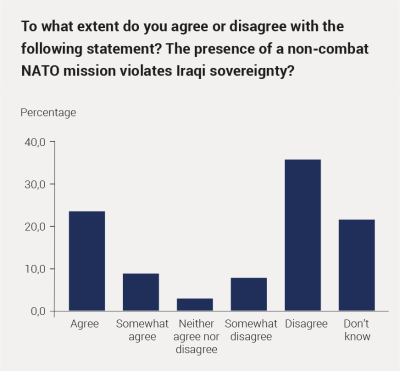
Citizens’ knowledge of NATO and the specific role of NMI might influence the safety of the mission. This was corroborated in the survey, where 18.7% of the surveyed Iraqis agreed or somewhat agreed that it is permissible to attack NATO personnel in Iraq. While there are some small variations across age, geographical location, religious and ethnic background, this sentiment was not confined to an isolated group.
Iraqis expressed the least favourable impression of Denmark
As part of the survey, the respondents were asked their opinions about different European states. Here, Denmark was the country viewed least favourably of the surveyed countries that included Germany, Sweden, and Holland. Whereas 42.2% had a very favourable impression of Germany, this was only the case for 27% in relation to Denmark. This is not, however, reflected in opinions on whether Denmark can lead the NATO mission in Iraq. Whereas Germany stands out as the country that most (48.5%) agree can lead the NMI, there is not much variation between Denmark (30%), Sweden (29.3%) and Holland (31.7%).
For this nationally representative survey 1,606 interviews were conducted by the Independent Institute of Administration and Civil Society Studies (IIACSS), which is the only representative body of GALLUP in Iraq. The interviews are proportionate across Iraq’s 18 governorates, and are gender and age balanced. Due to COVID-19 restrictions the survey was carried out by phone, using computer-assisted telephone interviewing (CATI). Data collection was done in December 2020 and January 2021.
DIIS Experts


